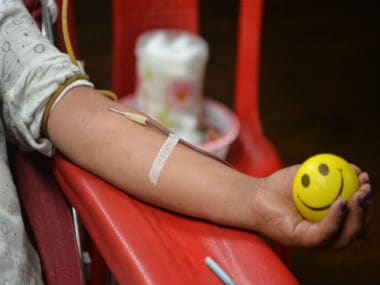Donate blood - save lives. We’ve all seen the poster, we’ve all heard the slogan. But not all of us have donated blood and, unfortunately, not all of us can. A pint of blood donated can save many lives. How? You will find out today. Dr Poonam Khetrapal Singh, Regional Director of World Health Organisation, South-East Asia, encourages people to donate blood by saying that it’s a simple, safe and effective way to make the biggest difference of all. [caption id=“attachment_7792141” align=“alignleft” width=“380”]  Representational image. Image source: Getty Images.[/caption]
Who needs blood to survive
Anyone who loses 40% of their blood volume (or 2 litres) needs blood urgently to survive. Even with great advancement in technology, blood cannot be created in a laboratory - it can only be donated. Some examples of people who might need blood are victims of severe road accidents, shooting or stabbing, cancer patients, women facing complications while giving birth, patients undergoing surgery or someone with a blood disorder such as haemophilia or thrombocytopenia.
Criteria for blood donation
Not everyone can donate blood. Only those who fulfil the criteria are allowed to donate. According to the Guidelines for blood donor selection (2017) by the Government of India, the following aspects need to be considered:
- Age: Donor should be over 18 and under 65.
- Weight: Donor should have a minimum weight of 45 kgs.
- Good health: Donor should not suffer from acute respiratory diseases or have any kind of illness at the time such as viral fever of common cold.
- Haemoglobin level: Donor should have a minimum haemoglobin level of 12.5 grams
- Pulse: Donor’s pulse should be normal (60-100)
- Blood pressure: Donor’s blood pressure should be 100-140mm Hg systolic 60-90mm Hg diastolic
- Occupational: Flight crew, long-distance drivers, emergency services personnel, etc should not donate in the 24 hours before their next shift.
- Women: Female donors should not be menstruating or lactating. They shouldn’t donate for 6 months after an abortion and 12 months after delivery.
- Risk behaviour: Persons considered at risk of HIV and Hepatitis B or C should not donate. This includes sex workers, transgenders, people with multiple sexual partners, drug users who use injections and men who’ve had sex with men in the last 12 months.
- Interval: For whole blood donations, female donors should give a gap of 120 day and male donors, a gap of 90 days.
- Chronic conditions: Donor should check with their doctor for their individual ability to donate blood.
Benefits of blood donation
An estimate suggests that out of every five Indians, one does not want to donate blood out of fear or danger to the body. In reality, blood donation has many health benefits, such as: 1. Healthy heart and liver: Every time you donate blood, someone checks your blood for signs of anaemia, infections like hepatitis A and hypertension (also known as the silent killer). A lot of the times, these conditions can go unnoticed and therefore untreated. Apart from contributing to a healthier world, regular blood donation ensures that you stay healthy too. Though rare, an excess of iron in the body can settle in your vital organs like the heart, liver and pancreas and negatively affect your health. Donating blood regularly also keeps your iron levels in check. 2. Generates new blood cells: Each time you donate blood, the doctors draw up to 470 ml or 8-9% of total blood volume. Within 24 to 48 hrs, the drawn volume of blood gets restored. The regeneration of blood occurs in the bone marrow by stem cells present inside long bones of our body. The newly formed blood cells rejuvenate our system. 3. Manages weight: A session of blood donation burns almost 600 calories. Sure, blood donation can’t replace daily exercises since you can only do it once every three months but it’s still good to know. 4. One pint can save several lives at once: Nothing can compare to the feeling of saving a life. One unit of blood can be used for various purposes to save lives at different critical points. Blood components such as red blood cells, platelets, plasma and cryoprecipitate (frozen blood) can be used separately also. For example, a person getting chemotherapy needs platelet transfusion rather than whole blood transfusion. For those who fear they might lose a considerable amount of blood by donating whole blood - you can also donate blood components individually, such as: Platelets: These are small cells flowing in the blood which help the blood to clot when needed. While donating platelets, a machine collects platelets and returns the rest of the blood to your body. Red blood cells (RBC): When you donate only RBCs, a machine separates the concentrated RBC from your blood and returns the rest of it to your body. Plasma: Another separate component of blood - plasma donation is rare, although urgently needed in burn cases. In this, blood is received from one arm, centrifuged to extract plasma out of it, and return the rest of blood to the body. For more information, please read our article on Blood Donation_._ Health articles in Firstpost are written by myUpchar.com, India’s first and biggest resource for verified medical information. At myUpchar, researchers and journalists work with doctors to bring you information on all things health.


)

)
)
)
)
)
)
)
)



